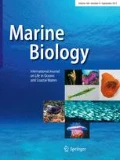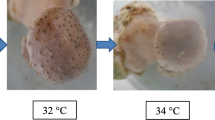Abstract
We have assessed the secondary-metabolite chemistry of freshly metamorphosed coral polyps, with and without zooxanthellae, using extremely sensitive electro-spray and Fourier-transform mass spectrometry. Coral larvae of the soft coral Lobophytum compactum of the same genetic background were reared, then inoculated with zooxanthellar strains of different taxonomic and geographic origin, and their terpenoid chemistry analysed. The identification of isolobophytolide in individuals of all treatment groups, including aposymbiotic control polyps, demonstrates that control of terpene production lies with the host coral and not their symbiotic algae.
Similar content being viewed by others
Author information
Authors and Affiliations
Additional information
Received: 29 November 1999 / Accepted: 22 November 2000
Rights and permissions
About this article
Cite this article
Michalek-Wagner, K., Bourne, D. & Bowden, B. The effects of different strains of zooxanthellae on the secondary-metabolite chemistry and development of the soft-coral host Lobophytum compactum. Marine Biology 138, 753–760 (2001). https://doi.org/10.1007/s002270000505
Issue Date:
DOI: https://doi.org/10.1007/s002270000505



